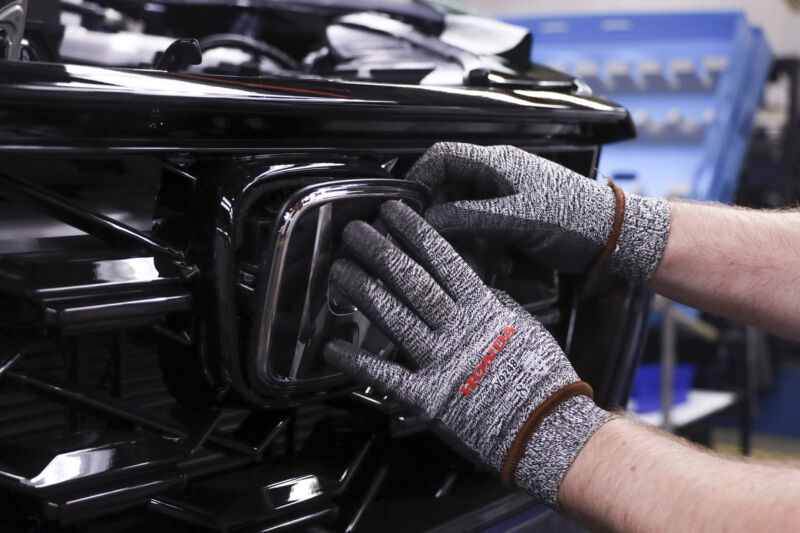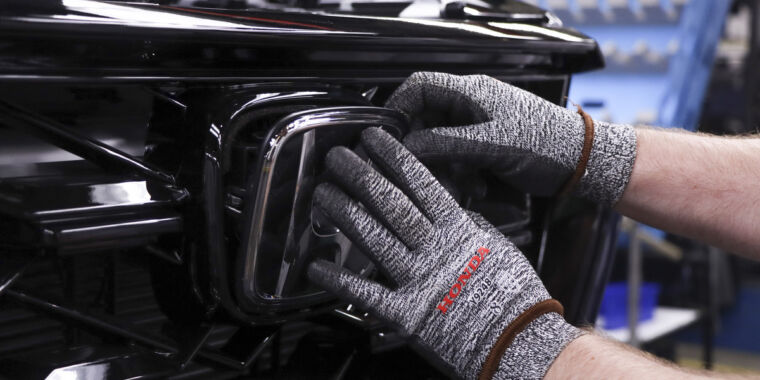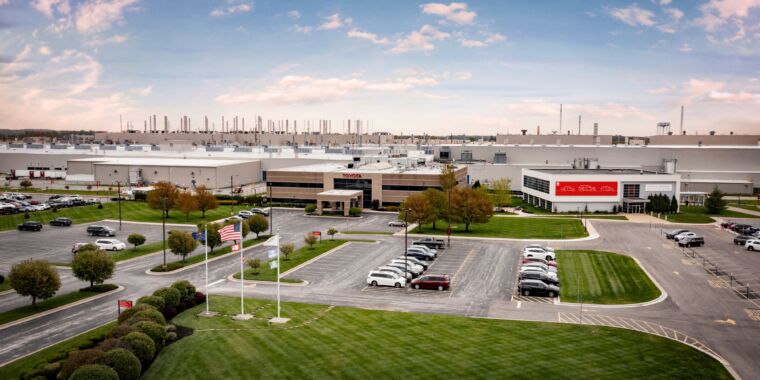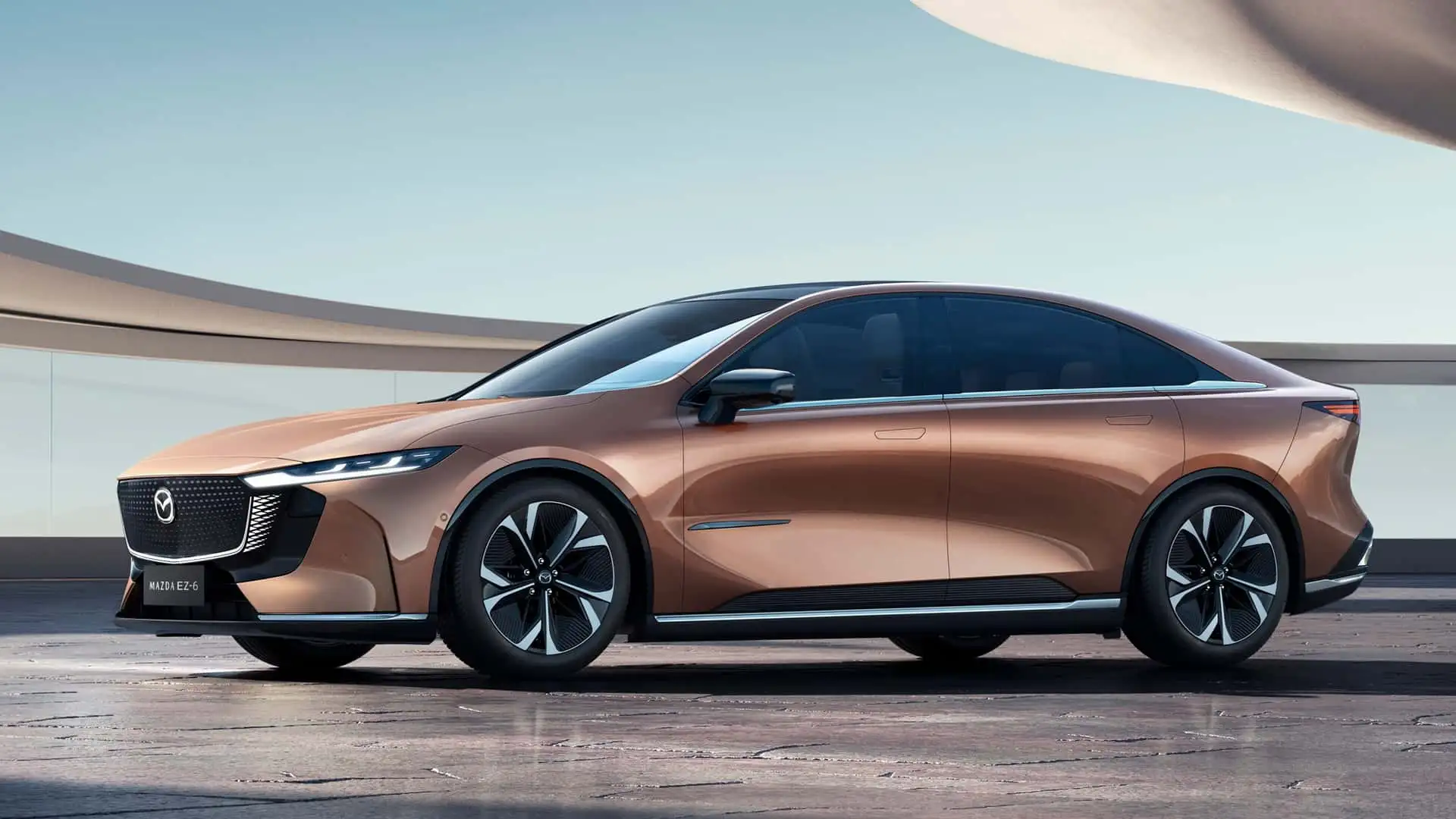
Honda announced today that it will spend $11 billion to expand its electric vehicle manufacturing presence in North America. The Japanese automaker already has a number of factories in the US, Mexico, and Canada, and it's this last one that will benefit from the expansion, with four EV-related plants planned for Ontario.
Honda says it has begun evaluating requirements for what it's calling an "innovative and environmentally responsible" EV factory and a standalone EV battery plant in Alliston, Ontario, which is already home to Honda's two existing Canadian manufacturing facilities.
Additionally, the automaker wants to set up another two sites as joint ventures. One will be a plant that processes cathode active materials and their precursors—the various elements like nickel and manganese that are combined with lithium in lithium-ion batteries—set up in a partnership with POSCO Future M, a South Korean battery material and chemical company. (POSCO is already working with General Motors on another joint venture battery precursor material facility in Betancour, Quebec, that is supposed to become operational in 2026.)
A second joint venture will be a partnership with Asahi Kasei, which will manufacture battery separators, the material that keeps the anode and cathode apart. The locations of these two joint ventures have not yet been announced.
Honda thinks it will be able to start making EVs in Ontario in 2028 and says the assembly plant will have the capacity to build 240,000 EVs per year. Meanwhile, the battery plant is planned to have an annual output of 36 GWh.
"Honda is making progress in our global initiatives toward the realization of our 2050 carbon neutrality goal," said Honda CEO Toshihiro Mibe. "In North America, following the initiative to establish our EV production system capability in the US, we will now begin formal discussions toward the establishment of a comprehensive EV value chain here in Canada, with the support of the governments of Canada and Ontario. We will strengthen our EV supply system and capability with an eye toward a future increase in EV demand in North America."
These investments in EV manufacturing by Honda are in addition to $700 million that it has spent retooling some of its factories in Ohio for electrification, plus a joint venture battery factory with LG Energy Solutions, also in Ohio, that has risen in cost to $4.4 billion. Honda says it expects to begin production of an electric sedan, shown off at CES earlier this year, in Ohio in late 2025. The brand currently has a single EV for the US market—the Honda Prologue—which shares one of GM's Ultium platforms. It is also developing an EV with Sony under the Afeela brand.

Honda to spend $11 billion on four EV factories in North America
The new facilities are in addition to the previously announced EV hub in Ohio.
US electric vehicle manufacturing got a bit of a boost today. Toyota has revealed that it is spending $1.4 billion to upgrade its factory in Princeton, Indiana, in order to assemble a new three-row electric SUV. That will add an extra 340 jobs to the factory, which currently employs more than 7,500 workers who assemble the Toyota Sienna minivan and the Toyota Highlander, Grand Highlander, and Lexus TX SUVs.
"Indiana and Toyota share a nearly 30-year partnership that has cultivated job stability and economic opportunity in Princeton and the surrounding southwest Indiana region for decades," said Governor Eric Holcomb.
"Toyota's investment in the state began with an $800 million commitment and has grown to over $8 billion. Today's incredible announcement shows yet again just how important our state's business-friendly environment, focus on long-term success, and access to a skilled workforce is to companies seeking to expand and be profitable far into the future. Indiana proudly looks forward to continuing to be at the center of the future of mobility," Holcomb said.
Curiously, Toyota says this will be an entirely different new three-row electric SUV from the one that it will build at its factory in Georgetown, Kentucky. That plant upgrade, which was made public last summer, will cost Toyota $1.3 billion.
Part of the improvements to the Princeton plant include a battery pack assembly line, which will use cells produced at a $13.9 billion battery plant in North Carolina, which is due to open next year.

Toyota will spend $1.4 billion to build electric 3-row SUV in Indiana
This is a different new 3-row EV from the one Toyota will build in Kentucky.



